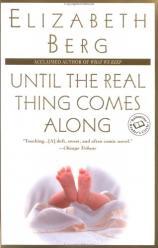Reading Group Guide
Discussion Questions
Until the Real Thing Comes Along (Ballantine Reader's Circle)

1. In the prologue Patty describes her "house game," a game about choice and commitment that reveals the "characteristic" Patty likes most about herself [page 3].
2. How is Patty's work as a real estate agent related to the "house game" she describes? Why is she such a "lousy" [page 16] real estate agent? What significance do houses have for Patty? For her clients? For her family?
3. The novel records Patty's glimpses into others' relationships-her parents' relationship, Artie and Muriel Berkenheimer's relationship. How do these relationships serve as models for Patty? In what ways do these relationships exceed her expectations? In what ways do they fall short?
4. As Patty describes her parents' marriage, she insists that "everything they have, I want" [page 46]. Still, she's surprisingly unaware of the details of their courtship and life together. She didn't know that they had fallen in love at first sight [page 44]. She hadn't heard that they never had a honeymoon [page 152]. Does this lack of awareness surprise you? Why? Why not?
5. Is Patty similarly unaware of events in the lives of her dearest friends? Why? Why not?
6. Although intimacy with her dearest friends and family members seems, at times, to be a real struggle for Patty, she is surprisingly intimate with her real estate clients, neighbors, and her manicurist. Artie Berkenheimer invites Patty to use his "breast glasses" [page 84], Sophia predicts Patty's pregnancy [page 118], and Amber offers friendship as well as advice [page 187]. What makes Patty so successful at establishing intimacy in these unexpected moments?
7. Patty admits that "sometimes it's hard to be [Elaine's] friend. A lot its hard to be her friend" [page 29]. Why is it hard? Do you blame Patty or Elaine for the rifts in their friendship? How satisfying is the friendship they offer to one another? What are the barriers to their friendship? Are these barriers surmountable?
8. Ethan and Elaine are united in encouraging Patty to pursue her relationship with Mark. Ethan encourages Patty to "just try" to make the relationship work [page 56], while Elaine insists that Mark is "the best thing" to happen to Patty in a long while [page 60]. Does Patty "try" to make the relationship work? Do you sympathize with Ethan and Elaine's insistence that Patty "try" harder? Or do you sympathize with Patty? Why?
9. Patty admits that she had never known the "real" Ethan during their engagement. She "could get close, but not there" [page 11]. Does she ever know the "real" Ethan? Does she ever feel that Ethan knows her "real" self?
10. Patty and Ethan both have certain hopes and expectations about the relationship a straight woman can have with a gay man. At what moments do these hopes or expectations converge? At what moments are they clearly in conflict? Is Patty fair to Ethan? Is Ethan fair to Patty?
11. Ethan insists that Patty's behavior during the pregnancy is "definitely" [page 170] his business. Is it? What claims does he have on her behavior? What control should he be able to exert over Patty's life? Over their daughter's life?
12. In a disturbingly frank conversation, Amber tells Patty that she feels Ethan is "running away from something" [page 186] by moving to Minneapolis. Although Patty dismisses Amber's comment, she later questions Ethan about his motives [page 192]. What are Ethan's motives for moving? What are Patty's motives?
13. Patty insists that she wants a conventional home. She says, "I thought all you needed was a husband, a house, children, and a decent oven, and you could be happy" [page 50]. However, the life she creates for herself is anything but conventional. How do her parents and friends respond? Are you surprised by Patty's choices? Are you surprised by others' responses? Why? Why not?
14. Amber offers Patty a firm and difficult directive-"Be careful with your heart, kid" [page 187]. Is this possible for Patty? For any woman? What are the risks of failing to follow Amber's directive? What are the risks of succeeding?
15. When Patty's father tells Patty of her mother's Alzheimer's disease, she realizes that she had known all along. When did you know? Why didn't Patty acknowledge what she knew?
16. As Patty's pregnancy advances, she becomes increasingly aware of human mortality. Artie Berkenheimer acknowledges his cancer. Patty's mother suffers from Alzheimer's disease. Ethan's friends struggle with AIDS. How does this overwhelming awareness of disease and death impact Patty's experience of pregnancy? How does it shape the expectations she has of relationships?
17. In the early paragraphs of the novel, Patty distinguishes between what is imaginary and what is true. Although she acknowledges that she has a rich imagination, she admits that "what I never imagined was the truth" [page 8]. How powerful is imagination? What are the limits of imagination?
18. The novel's concluding image, "the creak of the rocker, the luscious fact of my sleeping daughter . . ." [page 240], is extraordinarily reminiscent of an earlier, imagined scene, "Here I am in a little bedroom in my little cottage . . ." [page 16]. In this way, the novel demands that we compare the real world Patty has built for herself with the imaginary world she had envisioned. How do these worlds--imaginary, real--compare?
19. Why is the novel titled Until the Real Thing Comes Along? What is the "real thing"? Does the "real thing," in fact, "come along"? Does Patty's definition of the "real thing" change over the course of the novel? Does yours?
20. Patty imagines that God's definition of "human beings" is that "they are supposed to make what they want out of what they are given" [page 240]. Is this a definition with which you agree? How successful a human being is Patty?
Until the Real Thing Comes Along (Ballantine Reader's Circle)
- Publication Date: June 6, 2000
- Genres: Fiction
- Paperback: 272 pages
- Publisher: Ballantine Books
- ISBN-10: 034543739X
- ISBN-13: 9780345437396








